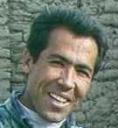China Releases Uyghur Church Leader from Prison
 A Uyghur Christian in China’s troubled Xinjiang region was released earlier this month after serving two years in a labor camp for alleged “illegal proselytizing” and “leaking state secrets,” according to Compass Direct News sources.
A Uyghur Christian in China’s troubled Xinjiang region was released earlier this month after serving two years in a labor camp for alleged “illegal proselytizing” and “leaking state secrets,” according to Compass Direct News sources.
House church leader Osman Imin (Wusiman Yaming in Chinese) was freed Nov. 18, sources said. Authorities had called for a 10- to 15-year prison sentence for Osman but significantly reduced the term following international media attention.
(Photo: China Aid Association)
An outspoken leader of the Uyghur church in the northwestern region of China, Osman was first arrested in 2004 and kept at a detention center in Hotan, southern Xinjiang. Local sources said his arrest was almost certainly related to his church work.
There he was chained to a metal bed in winter and frequently beaten while interrogated. Osman was released on bail on Nov. 18, 2004, but bail was canceled in October 2006. On July 26, 2007, he was again placed under supervised house arrest and finally detained by police on Nov. 19 of that year on the charge of “revealing state secrets.”
Authorities denied him access to a lawyer, and in June 2008 a court rejected his appeal without explanation.
Authorities eventually moved him to the labor camp outside Kashgar. While in prison Osman was forced to work 12 to 15 hours a day, and his health quickly deteriorated. He was reportedly suffering malnutrition throughout his confinement.
Osman and his wife, Nurgul, have two young daughters.
Still in arbitrary detention in the region is another Uyghur Christian, Alimjan Yimit (Alimujiang Yimiti in Chinese). Officials initially closed the foreign-owned business Alimjan worked for in September 2007 and accused him of using it as a cover for “preaching Christianity.” He was then detained in January 2008 on charges of endangering state security and was formally arrested on Feb. 20, 2008, on charges of “inciting secession” and leaking state secrets.
Court officials returned Alimjan’s case to state prosecutors in May 2008, citing lack of evidence. Last May 21, government sources told Alimjan’s mother that the Public Security Bureau (PSB) in Kashgar planned to quietly sentence him to three years of re-education through labor, thereby circumventing the court system.
Under Chinese law the PSB, which originally filed the case against Alimjan, may authorize such sentences without approval from the court or other state agencies.
Court authorities have returned Alimjan’s case to state prosecutors, citing lack of evidence for charges of “leaking state secrets” and “inciting secession.” Family, friends and work colleagues have insisted that Alimjan is a loyal citizen with no access to state secrets, and that his arrest was due largely to his Christian faith and association with foreign Christians.
In Xinjiang’s politically charged environment, Alimjan’s family and friends fear he could face execution if he were wrongly linked with alleged Uyghur separatists.
Sources said there appears to be a concerted effort to shut down the leadership of the Uyghur church in a restive region where authorities fear anything they cannot control. The region of ethnic Uyghurs has come under a government crackdown the past two years as long-simmering tensions erupted.
Disputes over ownership of Xinjiang’s land and rich mineral resources have led to resentment between Uyghurs— native to Xinjiang—and Han Chinese. Religious differences are also an issue, with a vast majority of Uyghurs practicing Islam, while most Chinese are officially atheists or follow Buddhism or syncretistic folk religions. Only a handful of China’s estimated 10 million Uyghurs are known to be Christians.
As part of authorities’ apparent effort to clamp down on Christianity, they have disbarred several lawyers involved in the defense of Uyghur Christians, including Alimjan’s attorney, Li Dunyong. He was effectively disbarred at the end of May when Chinese authorities turned down an annual application to renew his law license.
Zhang Kai, another Beijing lawyer who had defended Alimjan, suffered the same fate.
Authorities failed to renew licenses for at least 15 other lawyers who had defended civil rights cases, religious and ethnic minorities and political dissidents, according to watch group Human Rights in China.















































